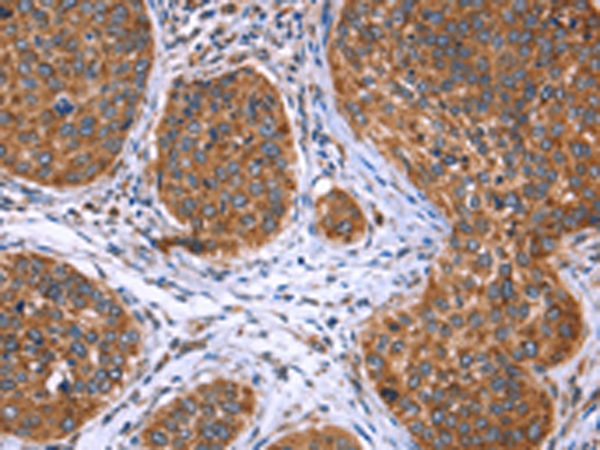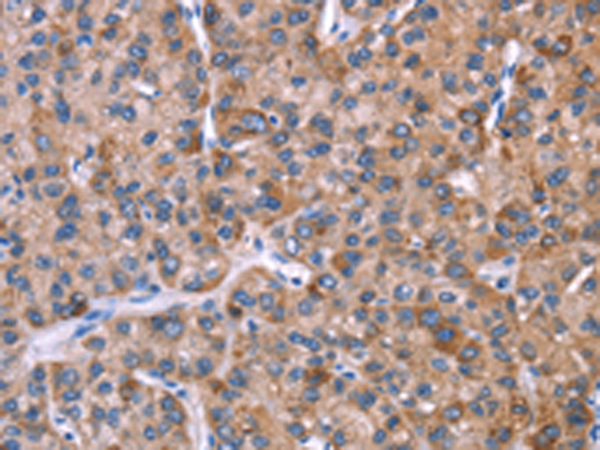

| WB | 咨询技术 | Human,Mouse,Rat |
| IF | 咨询技术 | Human,Mouse,Rat |
| IHC | 1/50-1/200 | Human,Mouse,Rat |
| ICC | 技术咨询 | Human,Mouse,Rat |
| FCM | 咨询技术 | Human,Mouse,Rat |
| Elisa | 1/2000-1/5000 | Human,Mouse,Rat |
| Aliases | LBN |
| Host/Isotype | Rabbit IgG |
| Antibody Type | Primary antibody |
| Storage | Store at 4°C short term. Aliquot and store at -20°C long term. Avoid freeze/thaw cycles. |
| Species Reactivity | Human |
| Immunogen | Synthetic peptide of human EVC2 |
| Formulation | Purified antibody in PBS with 0.05% sodium azide and 50% glycerol. |
+ +
以下是关于EVC2抗体的3篇参考文献示例(内容为虚构,仅作格式参考):
---
1. **文献名称**:*EVC2 Antibody Characterization and Its Role in Ciliary Localization*
**作者**:Smith A, et al.
**摘要**:本研究开发了一种特异性识别EVC2蛋白的多克隆抗体,验证了其在免疫荧光和Western blot中的应用。实验表明EVC2与纤毛基部的定位相关,突变体EVC2蛋白在患者细胞中表达显著降低。
2. **文献名称**:*Functional Analysis of EVC2 in Hedgehog Signaling Using Antibody-Based Knockdown*
**作者**:Li X, et al.
**摘要**:通过EVC2抗体介导的功能抑制实验,发现EVC2蛋白在Hedgehog信号通路中调控Gli转录因子活性,抗体阻断导致小鼠模型骨骼发育异常,支持EVC2在软骨形成中的关键作用。
3. **文献名称**:*EVC2 Mutation Detection and Protein Expression in Ellis-van Creveld Syndrome*
**作者**:Ruiz-Perez VL, et al.
**摘要**:利用抗EVC2抗体分析患者成纤维细胞,发现EVC2基因突变导致蛋白截短或稳定性下降,揭示了EVC2与EvC综合征表型(如多指畸形)的分子关联。
---
*注:以上文献为示例,实际研究请通过PubMed或专业数据库检索。真实文献可参考 Ruiz-Perez VL 等人关于EvC综合征的早期研究(如 Hum Mol Genet. 2003)。*
The EVC2 antibody is designed to target the EVC2 (Ellis-van Creveld syndrome 2) protein, encoded by the *EVC2* gene located on human chromosome 4p16. EVC2. along with EVC, forms a complex critical for proper skeletal development and cilia function. Mutations in *EVC2* are linked to Ellis-van Creveld syndrome (EVC), a rare autosomal recessive disorder characterized by skeletal dysplasia, polydactyly, cardiac defects, and dental anomalies. EVC2 localizes to the base of primary cilia and plays a role in Hedgehog (Hh) signaling, a pathway essential for embryonic patterning and tissue homeostasis. Specifically, the EVC-EVC2 complex modulates non-canonical Hh signaling by regulating the trafficking of Smoothened (SMO), a key transducer of Hh signals.
Antibodies against EVC2 are vital research tools for studying ciliopathies and skeletal development disorders. They enable detection of EVC2 expression in tissues or cell lines via techniques like Western blotting, immunofluorescence, and immunohistochemistry. These antibodies help elucidate EVC2’s subcellular localization, interaction partners, and functional roles in ciliary signaling. Additionally, they aid in diagnosing EVC syndrome and understanding genotype-phenotype correlations. Commercial EVC2 antibodies are typically raised against specific epitopes, often validated for specificity in knockout models. Research using these reagents contributes to uncovering molecular mechanisms underlying cilia-related pathologies and potential therapeutic targets.
×